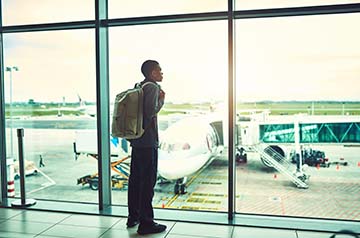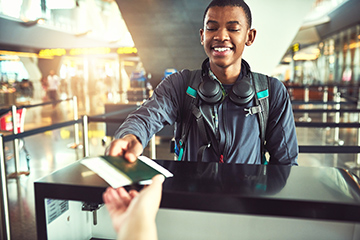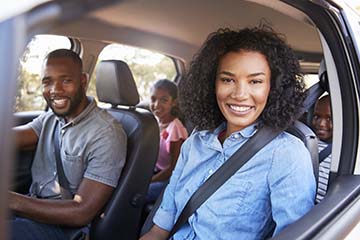Travelling abroad
 The benefits of travelling abroad are so many that you should ask yourself why you aren’t doing it more often. It gives you the opportunity to move out of your comfort zone. You will encounter new cultures and appreciate your own better when you see it in an international context. Travelling allows you to make new friends and expand your general knowledge.
The benefits of travelling abroad are so many that you should ask yourself why you aren’t doing it more often. It gives you the opportunity to move out of your comfort zone. You will encounter new cultures and appreciate your own better when you see it in an international context. Travelling allows you to make new friends and expand your general knowledge.
Whether you’re travelling abroad for the first time or you're a seasoned traveller, it’s important that you always plan ahead. Learn as much as you can about the country you’re travelling to. Although English is the main language of communication, try to learn a few phrases in the local language spoken in the country that you’re visiting.
Health and Security
Take medical precautions before your travels:
- Make sure you know all the possible health risks in the country you’ll be travelling to. Get all the required vaccinations from your doctor if needed. Here’s more information about Malaria and Yellow fever.
- Make sure that your travel insurance covers hospital treatment, medical evaluation and even death.
In addition to health risks, be aware of safety risks as well:
- Be aware of possible crime in the country that you’ll be visiting.
- Try not to visit countries experiencing war and/or civil/political unrest.
Passport
If you're a South African citizen and planning on travelling to another country, you'll need a South African passport.
Apply for a passport well in advance. Application forms are available at all the Department of Home Affairs regional offices and at South African Embassies overseas.
If you have any questions about passports, you can contact the Department of Home Affairs in Pretoria on -
- +27 12 395 4307 from overseas, or
- 0800 60 11 90 within South Africa, or
- the Home Affairs Contact Centre via email on hacc@dha.gov.za, or
- any Home Affairs regional office.
As a backup, leave a copy of your passport at home with someone you trust or make an electronic copy you can keep in your email account. Ensure that your passport is valid for at least 6 months with enough blank pages.

In the event where you're travelling with a minor (any person under the age of 18), there are requirements, which you need to keep in mind.
Visas
In addition to a passport, South African citizens are also required to have travel visas for certain countries which you may want to visit.
Find out what the visa requirements for South African passport holders are.
Register your personal details and travel itineraries with the Department of International Relations and Co-operation (DIRCO) before travelling overseas through ROSA (Registration of South Africans Abroad, which is a software program to register online). This information will allow the Department to help you, should you experience an emergency while overseas. Registration is free and open to all South Africans who are travelling, living, studying or working overseas.
Money
Look up the exchange rate of the currency you’ll be using on your travels before you go. Remember to take enough money for your trip with some back-up funds, such as traveller’s cheques or credit cards. Find out how you can replace your traveller’s cheques and credit cards if you lose them.
Notify your bank and let them know where you’ll be travelling to and on which dates. Research your destination(s) and find out if they do take credit cards and whether ATMs are easy to find or not.
Phones and electrical equipment
Investigate phone plans of the country you’ll be travelling to and see if it’s cheaper to buy a local SIM card and use a new number and service provider or opt for international roaming plans. You can also turn your phone on Airplane mode and Wi-Fi to call using Skype or WhatsApp on shorter trips. Download all the apps you’ll need before you travel to avoid downloading charges.
Investigate electrical outlets of the country that you’re visiting and take a charger or adapter. Countries have different size plugs and voltage.
Luggage and packing
Always lock your luggage, not only to discourage theft but to make sure it doesn’t open during handling. Buy small locks to lock all external zipper pockets of bags. This will also protect you against others slipping illegal substances into your luggage. Little plastic cable ties are extremely useful, as they have to be cut to be opened.
Never carry luggage, a package or letters for someone else, unless you have been able to verify the contents completely. Pack your own baggage, fasten it securely and never leave it unattended. Keep an eye on your children’s backpacks, toys and stuffed animals.
 Driving abroad
Driving abroad
If you’re planning to drive in a foreign country you need to apply for an international driving permit (IDP). An IDP is issued by the Automobile Association of South Africa. Your licence should be current and valid. It’ll help to know the local traffic laws of the country that you plan to visit.
South African drivers’ licences are recognised in SADC countries (Angola, Botswana, the Democratic Republic of Congo, Lesotho, Madagascar, Malawi, Mauritius, Mozambique, Namibia, Swaziland, United Republic of Tanzania, Zambia and Zimbabwe).
If you’re travelling by road it’s advisable to have the original car registration documents and a certified copy with you at all times. Find out where you can get the temporary import permit for the car/trailer, before the trip. Make sure that the car insurance will be covered in the country that you’re travelling to by getting a written confirmation from your insurer.
Tips for those travelling alone
If you’re planning to travel alone there are a few tips you should consider:
- Set a budget and save up.
Saving up and planning a budget for your upcoming trip is an important part of any trip, solo or not. You have to do some research beforehand, check the prices of food, transportation, activities, and make sure you have some emergency funds as back up. Remember, you won’t have a travel partner to rely on if you run out of funds. - Buy travel insurance before you travel.
Anything can happen abroad. You might get ill or injured and would have to see a doctor. Travel insurance will cover the costs of those hospital or doctor visits. Speak to your insurance company and see what travel insurance is available before you travel. - Research your destination, accommodation and activities beforehand
Research as much as you can about your destination, read online reviews, speak to a legitimate travel agent or friends who’ve been there before. - Inform your family or friends about your trip.
Give your family and friends a copy of your itinerary before your travel abroad. Let them know where you’ll be going, when you’re going and the names of the airlines, hotel etc. - Be vigilant and alert.
Crime does happen abroad. Travelling can be daunting especially if you’re traveling alone for the first time, the experience can leave you vulnerable to people with wicked agendas. If something happens to you while you’re alone it’ll be overwhelming. Be alert of scams, thieves, and fraudsters.
Travel smart with the Department of International Relations and Cooperation (DIRCO)
The Department of International Relations and Cooperation (DIRCO) assists South African citizens who find themselves in distress and / or destitute abroad. DIRCO has a consular awareness programme that provides helpful hints on how to stay safe abroad and ensure that you’re covered in case things go wrong. #TravelSmartWithDIRCO


